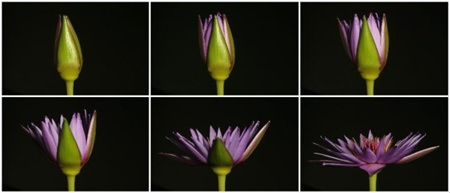
Every photograph you have ever taken represents a moment in time recorded for posterity. 1/60th second of your world frozen for eternity. The famous French photographer Lartigue (1894 – 1986, was particularly good at this. So was Henri Cartier-Bresson (1908 – 2004), who coined the phrase “the decisive moment,” showing photography gives longevity perhaps?
However, in time lapse photography, you record a series of these “decisive moments”, one after the other, all related to each other. This kind of photography will show such items as the development of a flower, or the butterfly emerging from the chrysalis. You know the sort of thing – all very National Geographic or Disney World. Any of you who have seen the film “A Zed and Two Noughts” will also remember those scenes of bodies decomposing, all done by time lapse photography.
Before we go much further, time lapse should not be confused with time exposure photography. Time lapse covers multiple exposures, time exposure is one long exposure.
Time lapse photography is probably the easiest, yet most spectacular form of wall art that any amateur photographer can produce. And you do not need fancy equipment. In fact you and your point and shoot auto-everything compact can do it.
Now while all this style of time lapse photography sounds expensive and even time consuming, it does not need to be so. You can produce your own time lapse shots with any old camera. It just needs a little planning.
There is one photographer who on her birthday takes a photo of herself in the nude. This she has done for the past 30 something years and has produced a time lapse record of human aging. This series of shots has been studied by the medical profession, as it is the only such record that has been undertaken in the world. So, if it doesn’t depress you too much, there’s an idea for you!
No, for me, I want more instant gratification than that. I believe you should pick on something that can allow you to produce a finished product in the sort of time frame that you could sit with comfortably (and not lose the photographs taken previously). So let us look at some items that you could do easily, with just a point and shooter.
Here is one suggestion – buy a rose (they sell them in all bars every night) and place it in a vase by the window and shoot it at lunchtime. Leave it exactly where it is, and take one lunchtime shot every day for the next week. In that time, it will have spread its petals, begin to die, the petals will shrink up, the stem will bend over, the water will have gone cloudy and other attributes that will only become obvious when you study the shots. However, you must mount the shots, side by side, in order from the left. You have just produced a work of art in a week!
So you haven’t got the stamina for a week. What else can you do? Well, there is always the record of one object in daylight. Take six shots, one every two hours, of your house, for example, starting at 6 a.m. You will see how the different time of day produces different light, the sun’s movement produces different shadows and again, by mounting them side by side, in order from the left, you will have produced a work of art in one day! But mark the spot where you shoot from, so you have the same items in it.
So you don’t want to spend a day getting your definitive time lapse shots, so look at taking one hour. In that time you can document the progress of a snail along a wall, or serial shots of people walking down the street, or the way your beer glass empties. Just light it from behind with natural lighting to get the best effect. Probably repeat this a few times over a Sunday, with the final shot being a glass of water and two headache tablets.
So the choice of subject is totally under your control, and the way you mount the shots is also your control. Do get them mounted. Great wall art will ensue.
 |
 |
 |





